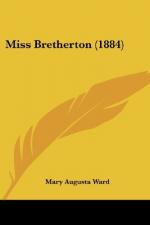Now, on this May afternoon, as he settled himself down to his work, it would have given any of those who liked Eustace Kendal—and they were many—pleasure to see how the look of fatigue with which he had returned from his round of the Academy faded away, how he shook back the tumbling gray locks from his eyes with the zest and the eagerness of one setting forth to battle, and how, as time passed on and the shadows deepened on the white spire opposite, the contentment of successful labour showed itself in the slow unconscious caress which fell upon the back of the sleeping cat curled up in the chair beside him, or in the absent but still kindly smile with which he greeted the punctual entrance of the servant, who at five o’clock came to put tea and the evening paper beside him and to make up the fire, which crackled on with cheery companionable sounds through the lamp-lit evening and far into the night.
CHAPTER II
Two or three days afterwards, Kendal, in looking over his engagement-book, in which the entries were methodically kept, noticed ‘Afternoon tea, Mrs. Stuart’s, Friday,’ and at once sent off a note to Edward Wallace, suggesting that they should go to the theatre together on Thursday evening to see Miss Bretherton, ‘for, as you will see,’ he wrote, ’it will be impossible for me to meet her with a good conscience unless I have done my duty beforehand by going to see her perform.’ To this the American replied by a counter proposal. ‘Miss Bretherton,’ he wrote, ’offers my sister and myself a box for Friday night; it will hold four or five; you must certainly be of the party, and I shall ask Forbes.’
Kendal felt himself a little entrapped, and would have preferred to see the actress under conditions more favourable to an independent judgment, but he was conscious that a refusal would be ungracious, so he accepted, and prepared himself to meet the beauty in as sympathetic a frame of mind as possible.
On Friday afternoon, after a long and fruitful day’s work, he found himself driving westward towards the old-fashioned Kensington house of which Mrs. Stuart, with her bright, bird-like, American ways, had succeeded in making a considerable social centre. His mind was still full of his work, phrases of Joubert or of Stendhal seemed to be still floating about him, and certain subtleties of artistic and critical speculation were still vaguely arguing themselves out within him as he sped westward, drawing in the pleasant influences of the spring sunshine, and delighting his eyes in the May green which was triumphing more and more every day over the grayness of London, and would soon have reached that lovely short-lived pause of victory which is all that summer can hope to win amid the dust and crowd of a great city.




